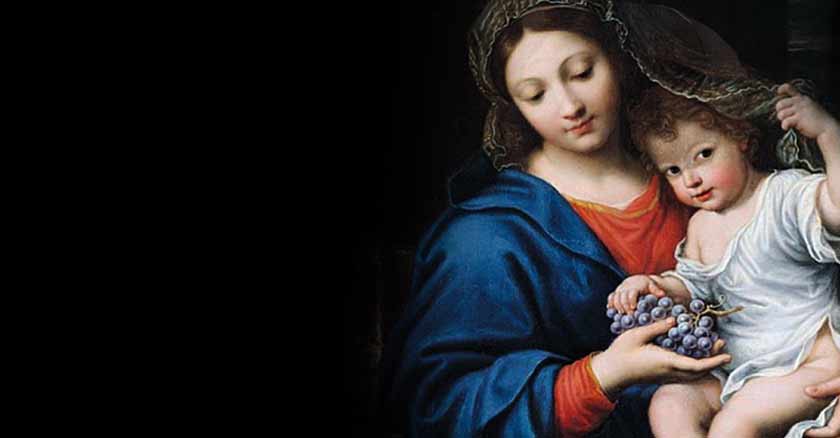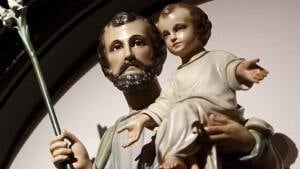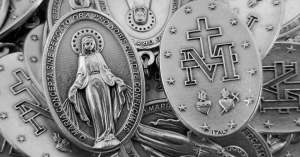God did not need a mother, but he wanted to have one to approach us with infinite love. Mary is the Mother of God. First dogma
Mary is the Mother of God. In the dictionary we find that "mother" is the woman who begets. It is said that she is the mother of the one she begat. If we accept that Mary is the mother of Jesus and that He is God, then Mary is the Mother of God.
One should not confuse time with eternity. Mary was obviously not the mother of the Son eternally. She began to be the Mother of God when the Eternal Son wanted to enter into time and become man like us.
To become man, God wanted to have a mother.
"When the fullness of time had come, God sent forth his Son, born of a woman. (Galatians 4:4)
God became man without ceasing to be God, therefore Mary is the mother of Jesus, true God and true man.
So Mary is the Mother of God, not because she begot him in eternity but because she begot him 2000 years ago in the Incarnation. God did not need a mother but wanted to have one to approach us with infinite love.
God is the only one who could choose his mother and, to the dismay of some and the joy of others, he chose the Blessed Virgin Mary who is and will always be the Mother of God.
When the Virgin Mary visited her cousin Elizabeth, she, moved by the Holy Spirit, called her "Mother of my Lord". The Lord to whom she refers can be none other than God. (Cf. Luke 1:39-45).
The truth that Mary is the Mother of God is part of the faith of all Orthodox Christians (of right doctrine). It was dogmatically proclaimed at the Council of Ephesus in 431 and is the first Marian dogma.
On the divine motherhood of Mary Most Holy.
Nestorius´ mistakes.
In the 5th century, Nestorius, Patriarch of Constantinople, stated the following errors:
That there are two distinct persons in Jesus, one divine and one human.
- His two natures were not united.
- Therefore, Mary is not the Mother of God because she is only the Mother of the man Jesus.
- Jesus was born of Mary only as a man and later "assumed" divinity, and that is why we say that Jesus is God.
We see that these errors of Nestorius, in denying that Mary is the Mother of God, also deny that Jesus was a divine person.
The doctrine concerning Mary is totally linked to the doctrine concerning Christ. To confuse one is to confuse the other. When the Church defends the divine motherhood of Mary she is defending the truth that her son, Jesus Christ, is a divine person.
In this doctrinal battle, St. Cyril, Bishop of Alexandria, played a very important role in clarifying the position of our faith against Nestorius´ heresy.
In the year 430, Pope Celestine I, at a council in Rome, condemned Nestorius´ doctrine and commissioned St. Cyril to initiate a series of correspondence to present the truth. Mary is the Mother of God and soon that truth was to be confirmed.
Council of Ephesus.
In the year 431, the Council of Ephesus took place where it was officially proclaimed that Mary is the Mother of God.
"From the beginning the Church teaches that in Christ there is only one person, the second person of the Holy Trinity. Mary is not only the mother of nature, of the body but also of the person who is God from all eternity. When Mary gave birth to Jesus, she gave birth in time to the one who from all eternity was God. Just as every human mother is not only the mother of the human body but of the person, so Mary gave birth to a person, Jesus Christ, who is both God and man, so she is the Mother of God" (Council of Ephesus)
Orthodoxy (righteous doctrine) teaches:
- Jesus is a divine person (not two persons)
- Jesus has two natures: he is truly God and truly Man.
- Mary is the mother of a divine person and therefore is the Mother of God.
Mary is the Mother of God. This is the principal of all Marian dogmas, and the root and foundation of the most unique dignity of the Virgin Mary.
So then, Mary is the Mother of God, not from all eternity but in time.
The dogma of Mary Mother of God contains two truths:
- Mary is truly a mother: This means that she contributed in every way to the formation of Christ´s human nature, as every mother contributes to the formation of the son of her womb.
- Mary is truly the Mother of God: She conceived and gave birth to the second person of the Trinity, according to the human nature that He assumed.
Christ´s divine origin does not come from Mary. But since Christ is a person of both divine and human natures Mary is both the mother of man and the mother of God. Mary is Mother of God, because she is Mother of Christ who is God-man.
Mary´s maternal mission is mentioned from the earliest creeds of the Church. In the Apostles´ Creed
"I believe in God the Father almighty and in Jesus Christ his only son, our Lord who was born of the Virgin Mary."
The title Mary Mother of God was used from the first Christian prayers. At the Council of Ephesus, the title Theotokos, which means Mother of God, was canonized.
From that moment on, the divine motherhood constituted a unique title of lordship and glory for the Mother of God Incarnate. The Theotokos is considered, represented and invoked as the queen and lady for being the Mother of the King and the Lord.
It was also later proclaimed and deepened by other universal councils, such as the Council of Chalcedon(451) and the second Council of Constantinople(553).
In the 14th century the second part of the Hail Mary was introduced where it says:
"Holy Mary Mother of God".
Pope Pius XI reaffirmed the dogma in the Encyclical Lux Veritatis (1931).
Mother of God in Vatican Council II.
This council restated the full extent of its theological richness in the most important of its documents, the Dogmatic Constitution on the Church, (Lumen Gentium). In this document the divine motherhood of Mary is seen in two aspects:
- The divine motherhood in the mystery of Christ.
- Divine Motherhood in the Mystery of the Church
"And, certainly, from the most ancient times, the Holy Virgin is venerated with the title of Mother of God, to whose protection the faithful supplicants take refuge in all their dangers and needs... And the various forms of piety toward the Mother of God which the Church has been approving within the limits of sound doctrine, make it so that, as the Mother is honored, the Son by reason of whom all things are, He may be better known, loved, and glorified, and at the same time His commandments may be better fulfilled" (LG #66)
In Paul VI´s Creed of the People of God (1968):
"We believe that the Blessed Mary, who remained forever a Virgin, was the Mother of the Incarnate Word, our God and Saviour."
In 1984, JP II consecrated the whole world to the C.I. of Mary, through the whole prayer of consecration he repeated:
"We have recourse to your protection, Holy Mother of God."
Mary, because she is the Mother of God, transcends in dignity all creatures, men and angels, since the dignity of the creature is in his closeness to God. And Mary is the closest to the Trinity. Mother of the Son, Daughter of the Father and Spouse of the Spirit.
"Knowledge of the true Catholic doctrine about Mary will always be the exact key to understanding the mystery of Christ and the Church"
"And the Mother of God is mine, because Christ is mine" (St. John of the Cross)
Prayer of St. Francis of Assisi to Mary, Mother of God
Hail, O Lady, Holy Queen, Mary, holy Mother of God: you are the Virgin made Church, chosen by the most holy Father in heaven, whom he consecrated with his most holy and beloved Son and with the Holy Spirit the Paraclete, in whom there was and is all the fullness of grace and all good.
Hail to his palace!
Hail to his tabernacle!
Hail to his dwelling place!
Hail to His Robe!
Hail to his servant!
Hail to his mother!
And save all the holy virtues that are poured into the hearts of the faithful through the grace and illumination of the Holy Spirit, which, if they are unbelievers, can make them faithful to God.
Amen.
Mary, Mother of God and of all people who have recourse to you, pray for us in times of need.
 Venezuelan, faithful husband and father of a family. Electronic engineer and missionary of the faith. Committed to the proclamation of the Gospel. Solid believer that there are always new beginnings. Whoever has God has nothing to stop him.
Venezuelan, faithful husband and father of a family. Electronic engineer and missionary of the faith. Committed to the proclamation of the Gospel. Solid believer that there are always new beginnings. Whoever has God has nothing to stop him.





